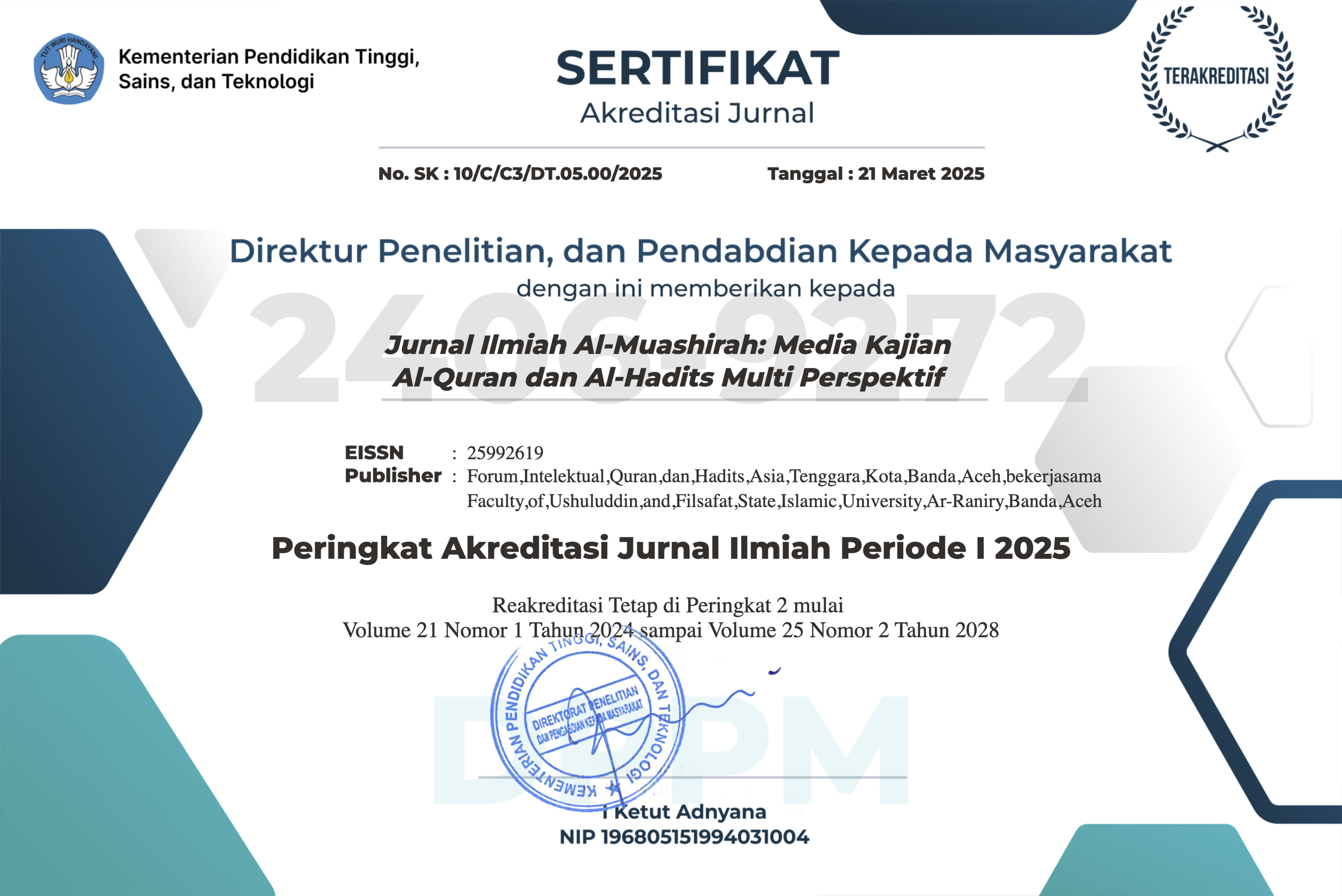Study of the Prophet's Prediction Hadith
DOI:
https://doi.org/10.22373/jim.v20i2.19456Keywords:
Hadiths, Prediction, InterpretationAbstract
This study aims to describe the interpretation of prophetic hadiths concerning the predictions by the Prophet as a guide for the future and how the methodology of understanding hadith contributes to a correct interpretation of these statements. This study uses a qualitative approach with a literature review method. This study showed that the predictions made by Prophet Muhammad in hadiths about the state of the community are not necessarily meant to be seen as inevitable destinies but rather as events that will unfold. The negative interpretations of these predictions have led to a loss of relevance in the present era. However, by understanding the distinctive characteristics of hadiths and applying the knowledge of fiqh al-hadith, one can better comprehend the statements of Prophet Muhammad SAW.
Downloads
References
Al-Sid, Muhammad ‘Atta, Sejarah Kalam Tuhan Kaum Beriman Menalar Al-Qur’an Masa Nabi, Klasik Dan Modern, ed. by Ilham B. Saenong (Jakarta: Teraju, 2004)
Azra, Azyumardi, Jaringan Ulama Timur Tengah Dan Kepulauan Nusantara Abad XVII Dan XVIII: Akar Pembaruan Islam Indonesia (Jakarta: Kencana, 2007)
Crowther, Jonathan, Oxford Advanced Learner's Dictionary (Oxford: Oxford University Press, 1995)
Farmer, Henry George, The Influence of Music from Arabic Source (Leiden: Leiden University Press, 1965)
Indra, Moersjid Qorie, Seputar Nagham Seni Baca Al-Qur’an (Qaf media, 2019)
Jauziyah, Ibnu Qayyim al, Aunul Ma’bud Syarah Sunan Abu Daud (Jakarta: Pustaka Azzam, 2008)
Muhaya, Abdul, Bersufi Melalui Music: Sebuah Pembelaan Music Sufi Oleh Ahmad Al-Ghazali (Yogyakarta: Gama Media, 2004)
Munir, M. Misbachul, Pedoman Lagu-Lagu Tilawati Qur’an Dilengkapi Dengan Tajwid Dan Qasyidah (Surabaya: Apollo Lestari, 1997)
Nelson, Kristina, The Art of Reciting the Qur’an (Bandung: Mizan, 2001)
Noorhidayati, Salamah, Hibbi Farihin, and Thoriqul Aziz, ‘MELACAK SEJARAH DAN PENGGUNAAN NAGHAM ARABI DI INDONESIA’, QOF, 5.1 (2021) <https://doi.org/10.30762/qof.v5i1.3592>
Shalihah, Khadijah, Peranan Suara Dan Nada Dalam Melantunkan Lagu-Lagu Al-Qur’an, Dalam Buku Bunga Rampai Mutiara Al-Qur’an, Pembinaan Qari- Qariah Dan Hafiz-Hafizah (Jakarta: Pimpinan Pusat Jam’iyyatul Qurra’ wal Huffazh, 2006)
Suarni, Suarni, ‘Development of the Nagham Qur’an’, Jurnal Ilmiah Al-Mu’ashirah, 20.1 (2023), 50 <https://doi.org/10.22373/jim.v20i1.16494>
Sulayman, Abu Dawud, Sunan Abu Dawud (Beirut: al-Risalah al-‘Alimiyah, 2009)
Syahid, Ahmad, Sejarah Dan Pengantar Ilmu Nagham, Dalam Bunga Rampai Mutiara Al-Qur’an, Pembinaan Qari-Qari’ah Dan Hafizh-Hafizah (Jakarta: Jam’iyyatul Qurra’ Wal Huffazh (JQH), 2006)
sunnah.com, ‘Sahih Al-Bukhari 1469 - Obligatory Charity Tax (Zakat) - كتاب الزكاة - Sunnah.Com - Sayings and Teachings of Prophet Muhammad (صلى الله عليه و سلم)’ <https://sunnah.com/bukhari:1414>
———, ‘Sahih Muslim 1381 - The Book of Pilgrimage - كتاب الحج - Sunnah.Com - Sayings and Teachings of Prophet Muhammad (صلى الله عليه و سلم)’ <https://sunnah.com/muslim:1381>
———, ‘Sunnah.Com - Sayings and Teachings of Prophet Muhammad (صلى الله عليه و سلم)’ <https://sunnah.com/urn/6124560>
Sunnah.com, ‘Sunan An-Nasa’i 2555 - The Book of Zakah - كتاب الزكاة - Sunnah.Com - Sayings and Teachings of Prophet Muhammad (صلى الله عليه و سلم)’ <https://sunnah.com/nasai:2555>
Downloads
Additional Files
Published
Issue
Section
License
Authors who publish in Jurnal Ilmiah Al-Mu'ashirah agree to the following terms:
- Authors retain copyright and grant the journal right of first publication with the work simultaneously licensed under a Attribution-ShareAlike 4.0 International (CC BY-SA 4.0) License that allows others to share the work with an acknowledgment of the work's authorship and initial publication in this journal.
- Authors are able to enter into separate, additional contractual arrangements for the non-exclusive distribution of the journal's published version of the work (e.g., post it to an institutional repository or publish it in a book), with an acknowledgment of its initial publication in this journal.
- Authors are permitted and encouraged to post their work online (e.g., in institutional repositories or on their website) prior to and during the submission process, as it can lead to productive exchanges, as well as earlier and greater citation of published work (See The Effect of Open Access).













